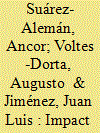| Srl | Item |
| 1 |
ID:
147496


|
|
|
|
|
| Summary/Abstract |
In late 2011, the Spanish terrorist organization ETA announced the end of armed violence after more than forty years of illegal activity. While the existing literature has already established the negative impact of terrorist actions on international tourism in a particular region, this paper aims to determine whether ETA’s final ceasefire and definitive dissolution had a positive impact on domestic tourism in Basque Country. To that end, a directed gravity model is estimated over a panel data-set of 699 domestic tourist flows between the Spanish regions from 2008 to 2013. Results suggest that the negative impact on visitor flows was localized in the Basque Country. Also, regardless of a permanent ceasefire announced in 2010, only the 2011 ‘definitive cessation of violence’ had an immediate significant impact on the number of visitors to the Basque Country. These results complement the scarce literature on post-conflict tourism analysis and may have implications for regional authorities in affected regions in their efforts to rebuild their destination brands.
|
|
|
|
|
|
|
|
|
|
|
|
|
|
|
|
| 2 |
ID:
177329


|
|
|
|
|
| Summary/Abstract |
Spanish premium oil operators have been accused of coordinating gasoline price cuts on Mondays. The objective of this practice, known as the “Monday effect” was to lower the official prices of automotive fuels - that was collected on Mondays - so as Spain was not at the top of the European price ranking. This behavior presumably ceased in May 2013 when Government began to consider the average prices of the entire week instead of Mondays prices. In order to test whether this anticompetitive behavior existed and ceased after the change in the data collection methodology, we employ a novel database that includes retail prices for all petrol stations in Spain in the period 2012–2013. Using a difference-in-difference estimator, we exploit this regulatory change to econometrically identify and confirm that: i) the three main companies, with 70% of the market share, have systematically established lower prices on Mondays, and that this is unjustified by either cost or demand; ii) this price reduction was small during 2012, but increased significantly in the first half of 2013. iii) following the change in the collection of price data by the government, the average Monday effect ‘disappeared’ from the Spanish gasoline market. Our results highlight the price coordination capacity of dominant oil operators in Spain and suggest that authorities that monitor cartels should be much more active in promoting competition in this sector, for example, by facilitating the entry of low-cost or independent stations and/or by being particularly alert to evidence of collusive behavior. Likewise, this coordination capacity must be taken into account when evaluating mergers in this sector and/or imposing fines.
|
|
|
|
|
|
|
|
|
|
|
|
|
|
|
|